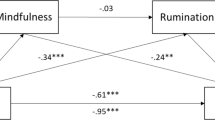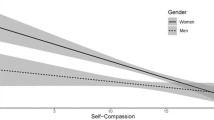Abstract
People who abuse substances in order to reduce distressing thoughts, uncomfortable physical sensations, and negative emotions, inadvertently increase these stress-related sensations. Deficits in emotion regulation skills, including self-evaluation skills, may have a role in determining this relationship. We examined the mediating role of self-evaluation in the relationship between substance abuse and stress. 57 adults who abused alcohol and other substances completed measures of self-evaluation, symptoms of stress, and severity of alcohol and substance abuse. We tested self-evaluation as a mediating variable in two models depicting the association between (1) severity of alcohol abuse and stress and (2) severity of other substance abuse and stress. Self-evaluation and severity of substance abuse (other than alcohol) accounted for 16% (F (2, 54) = 5.09, p < 0.01) of the variance in stress, and self-evaluation partially mediated the relationship between severity of substance abuse and symptoms of stress (unstandardized indirect effect =0.08). Self-evaluation was not correlated with severity of alcohol abuse. Substance abuse may be associated with deficits in self-evaluation skills, leading to poor regulation of stress.


Similar content being viewed by others
References
Antony, M. M., Bieling, P. J., Cox, B. J., Enns, M. W., & Swinson, R. P. (1998). Psychometric properties of the 42-item and 21-item versions of the depression anxiety stress scales in clinical groups and a community sample. Psychological Assessment, 10, 176–181. doi:10.1037/1040-3590.10.2.176.
Bandura, A. (1991). Social cognitive theory of self-regulation. Organizational Behavior and Human Decision Processes, 50, 248–287. doi:10.1016/07495978(91)90022L.
Becker, H. C. (2012). Effects of alcohol dependence and withdrawal on stress responsiveness and alcohol consumption. Alcohol Research: Current Reviews, 34, 448–458.
Cocco, K. M., & Carey, K. B. (1998). Psychometric properties of the drug abuse screening test in psychiatric outpatients. Psychological Assessment, 10, 408–414.
Conley, T. B. (2001). Construct validity of the MAST and AUDIT with multiple offender drunk drivers. Journal of Drug and Alcohol Abuse Treatment, 20, 287–295. doi:10.1016/S0740-5472(01)00159-3.
El-Bassel, N., Schilling, R., Schinke, S., Orlandi, M., Wei-Huei, S., & Back, S. (1997). Assessing the utility of the drug abuse screening test in the workplace. Research on Social Work Practice, 7, 99–114.
Febbraro, G., & Clum, G. (1998). Meta-analytic investigation of the effectiveness of selfregulatory components in the treatment adult problem behaviors. Clinical Psychology Review, 18, 143–161. doi:10.1016/S0272-7358(97)00008-1.
Kammeyer-Mueller, J. D., Judge, T. A., & Scott, B. A. (2009). The role of core self evaluations in the coping process: testing an integrative model. Journal of Applied Psychology, 94, 177. doi:10.1037/a0013214.
Kobeissy, F. H., Braga, C. F., Graham, N. A., & Gold, M. S. (2010). Pharmacological therapeutics for detoxification in addictive disorders. In N. S. Miller, M. S. Gold, N. S. Miller, & M. S. Gold (Eds.), Addictive disorders in medical populations (pp. 483–502). West Sussex: Wiley.
Koob, G. F., & Le Moal, M. (1997). Drug abuse: hedonic homeostatic dysregulation. Science, 278(5335), 52–58. doi:10.1126/science.278.5335.52.
Kreek, M. J., & Koob, G. F. (1998). Drug dependence: stress and dysregulation of brain reward pathways. Drug and Alcohol Dependence, 51, 23–47. doi:10.1016/S0376-8716(98)00064-7.
Kushner, M. G., Abrams, K., & Borchardt, C. (2000b). The relationship between anxiety disorders and alcohol use disorders: a review of major perspectives and findings. Clinical Psychology Review, 20, 149–171. doi:10.1016/S0272-7358(99)000276.
Kushner, M. G., Abrams, K., Thuras, P., & Hanson, K. L. (2000a). Individual differences predictive of drinking to manage anxiety among non-problem drinkers with panic disorder. Alcoholism: Clinical and Experimental Research, 24, 448–458. doi:10.1111/j.1530-0277.2000.tb02011.x.
Lagoni, L., Crawford, E., & Huss, M. T. (2011). An examination of the self-medicationhypothesis via treatment completion. Addiction Research & Theory, 19, 5. doi:10.3109/16066359.2010.525332.
Levine, S. (2005). Developmental determinants of sensitivity and resistance to stress. Psychoneuroendocrinology, 30, 939–946. doi:10.1016/j.psyneuen.2005.03.013.
MacKinnon, D. P., Lockwood, C. M., & Williams, J. (2004). Confidence limits for theindirect effect: distribution of the product and resampling methods. Multivariate Behavioral Research, 39, 99–128. doi:10.1207/s15327906mbr3901_4.
Magrys, S. A., & Olmstead, M. C. (2015). Acute stress increases voluntary consumption of alcohol in undergraduates. Alcohol and Alcoholism, 50, 213–218. doi:10.1093/alcalc/agu101.
Maremmani, A. G. I., Rovai, L., Bacciardi, S., Bertoni, S., Massimetti, E., Gazzarrini, D., et al. (2016). Addictive behaviours in heroin use disorder patients. Correlation with heroin-craving patients’ self-evaluation. Heroin Addiction and Related Clinical Problems, 18(1), 9–18.
McEwen, B. S. (2007). Physiology and neurobiology of stress and adaptation: central role of the brain. Physiological Reviews, 87, 873–904. doi:10.1152/physrev.00041.2006.
Mezo, P. G. (2009). The self-control and self-management scale (SCMS): development of an adaptive self-regulatory coping skills instrument. Journal of Psychopathology and Behavioral Assessment, 31(2), 83–93. doi:10.1007/s10862-008-9104-2.
Mezo, P. G., & Short, M. M. (2012). Construct validity and confirmatory factor analysis of the self-control and self-management scale. Canadian Journal of Behavioural Science, 44, 1–8. doi:10.1037/a0024414.
Preacher, K. J., & Hayes, A. F. (2004). SPSS and SAS procedures for estimating indirect effects in simple mediation models. Behavior Research Methods, Instruments, & Computers, 36, 717–731. doi:10.3758/BF03206553.
Preacher, K. J., & Hayes, A. F. (2008). Asymptotic and resampling strategies for assessing and comparing indirect effects in multiple mediator models. Behavior Research Methods, 40, 879–891. doi:10.3758/BRM.40.3.879.
Robinson, J., Sareen, J., Cox, B., & Bolton, J. (2011). Role of self-medication in the development of comorbid anxiety and substance use disorders: a longitudinal investigation. Archives of General Psychiatry, 68, 800–807. doi:10.1001/archgenpsychiatry.
Schuckit, M. A., & Hesselbrock, V. (1994). Alcohol dependence and anxiety disorders: what is the relationship? American Journal of Psychiatry, 151, 1723–1734.
Selzer, M. L. (1975). The Michigan alcoholism screening test (MAST): the quest for a new diagnostic instrument. American Journal of Psychiatry, 3, 176–181.
Skinner, H. A. (1982). The drug abuse screening test. Addictive Behaviors, 7, 363–371. doi:10.1016/0306-4603(82)90005-3.
Suttajit, S., Kittirattanapaiboon, P., Junsirimongkol, B., Likhitsathian, S., & Srisurapanont, M. (2012). Risks of major depressive disorder and anxiety disorders among Thais with alcohol use disorders and illicit drug use: findings from the 2008 Thai National Mental Health survey. Addictive Behaviors, 37, 1395–1399. doi:10.1016/j.addbeh.2012.06.014.
Tavolacci, M. P., Ladner, J., Grigioni, S., Richard, L., Villet, H., & Dechelotte, P. (2013). Prevalence and association of perceived stress, substance use and behavioral addictions: a cross-sectional study among university students in France, 2009–2011. BMC Public Health, 13(1), 1.
Teitelbaum, L. M., & Carey, K. B. (2000). Temporal stability of alcohol screening measures in a psychiatric setting. Psychology of Addictive Behaviors, 14, 401–404.
Contributors
All authors have contributed to the manuscript in a meaningful way.
As principal investigator, Ross D Connolly designed the study, facilitated data collection, conducted data analyses, and drafted the manuscript.
Dr. Noel contributed to the literature search, theoretical model development, figure design, and interpretation of the mediation model. Dr. Noel contributed to the writing of the introduction to summarize the literature search and the writing of the discussion to discuss the impact of the findings on the field.
Dr. Mezo provided oversight and consultation for method design, selection of measures, and implementation of data collection. Verified integrity of collected data. Reviewed final manuscript.
All authors have approved the final article.
Author information
Authors and Affiliations
Corresponding author
Ethics declarations
Informed Consent
All procedures followed were in accordance with the ethical standards of the responsible committee on human experimentation (institutional and national) and with the Helsinki Declaration of 1975, as revised in 2000. Informed consent was obtained from all participants included in the study.
Role of Funding Source
No funding.
Conflict of Interest
Ross D. Connolly declares that he has no conflict of interest. Valerie Noel declares that she has no conflict of interest. Peter G. Mezo declares that he has no conflict of interest.
Rights and permissions
About this article
Cite this article
Connolly, R.D., Noel, V. & Mezo, P.G. Self-Evaluation as a Mediating Variable between Substance Abuse and Stress. Int J Ment Health Addiction 15, 1055–1063 (2017). https://doi.org/10.1007/s11469-017-9735-1
Published:
Issue Date:
DOI: https://doi.org/10.1007/s11469-017-9735-1




